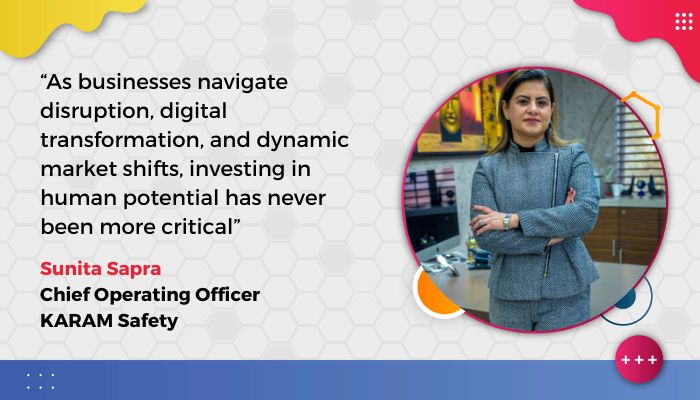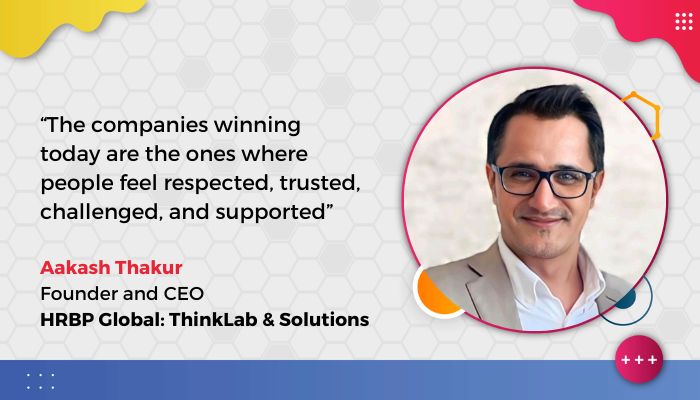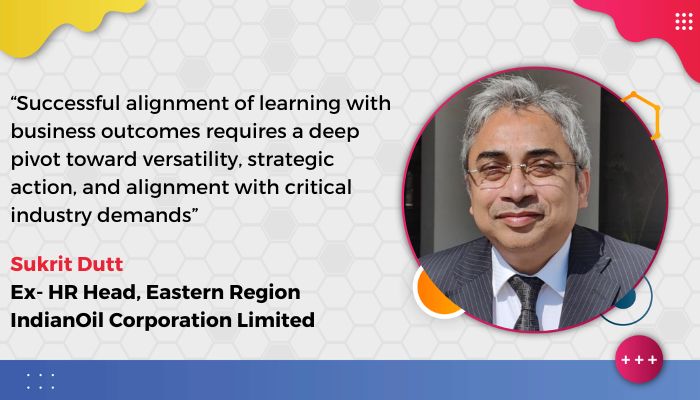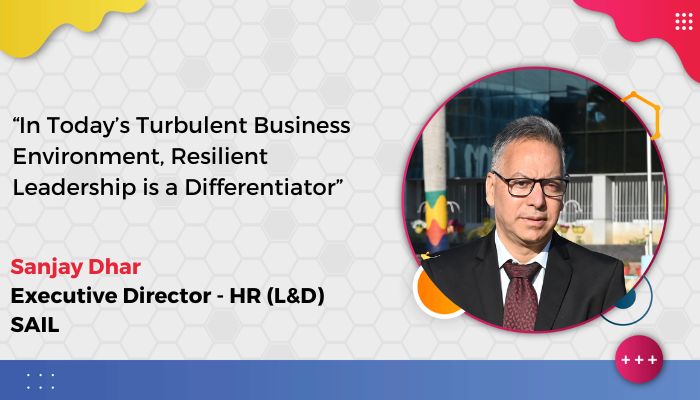By Sunita Sapra, Chief Operating Officer (COO), KARAM Safety
The most successful organisations are those that recognise a simple but profound truth: people are not just resources. They are the foundation of progress. As businesses navigate disruption, digital transformation, and dynamic market shifts, investing in human potential has never been more critical.
Building a culture of care and belonging
At the core of any thriving organisation lies a culture that values people, not just as employees, but as whole individuals. Fostering psychological safety, emotional well-being, and a sense of inclusion is no longer optional; it is essential. Companies that prioritise open communication, mental health awareness, and inclusive workspaces witness higher engagement, stronger retention, and deeper trust within teams.
Organisations that lead with empathy are setting a new benchmark. Whether it’s through stress management programs, wellness initiatives, or open-door leadership, creating a culture of care directly fuels productivity and loyalty.
Learning as a strategic imperative
Training is not a checkbox activity; it is a continuous investment in capability and confidence. In progressive workplaces, Learning & Development (L&D) is embedded into the DNA of the business. From onboarding to upskilling, technical certifications to behavioural coaching, organisations that invest in learning are better equipped to innovate, adapt, and lead.
Self-paced learning, cross-functional exposure, and experiential workshops empower employees to own their career journeys. It is this spirit of curiosity and lifelong learning that drives real transformation, both for individuals and the enterprise.
Nurturing the next generation of leaders
Organisations must look beyond today and prepare for tomorrow by cultivating future-ready leaders. Structured leadership programs, centred on decision-making, empathy, people management, and strategic vision ,are key to building a resilient pipeline of talent.
Mentoring, coaching, and feedback-rich environments allow emerging leaders to evolve with clarity and confidence. Companies that actively invest in leadership development not only ensure continuity but also reinforce a culture of purpose and accountability.
Fostering connection in the workplace
People stay where they feel seen, heard, and connected. Employee engagement is not just about fun Fridays or newsletters. It’s about creating meaningful touchpoints that foster dialogue, collaboration, and shared purpose.
Regular town halls, team huddles, and knowledge-sharing forums are powerful ways to create alignment and community. When employees feel a sense of belonging and collective ownership, performance becomes a natural outcome.
Infrastructure that enables growth
A people-first mindset is reflected not only in policies but in the very design of the workplace. From ergonomic workspaces to digital tools that enhance collaboration, infrastructure must be thoughtfully aligned with employee well-being and performance.
Organisations committed to growth invest in systems that support learning, innovation, and sustainability. A well-designed workplace, both physical and virtual, is a silent but powerful enabler of success.
Embedding diversity, equity & inclusion (DEI) into the DNA
True innovation thrives in diverse and inclusive environments. Forward-thinking companies are embedding DEI into every aspect of the employee lifecycle, from unbiased hiring and equitable policies to ongoing awareness programs that challenge unconscious bias.
It’s not just about representation. It’s about building cultures where every voice matters. When people from different backgrounds, perspectives, and experiences come together, the outcome is always richer, more dynamic, and more innovative.
A case in point: KARAM Safety
At KARAM Safety, where I have the privilege of serving as COO, we have seen firsthand the impact of these investments. By focusing on structured training, open dialogue, leadership grooming, and inclusive practices, we’ve been able to build not just a successful business but a deeply engaged workforce. Our commitment to our people is reflected in everything, from our Learning & Development initiatives to our world-class infrastructure and DEI frameworks.
But KARAM is just one example. Across industries and geographies, organisations that treat their people as partners in progress are the ones redefining success today.
Final thoughts: People first, always
In a world driven by metrics, speed, and outcomes, it’s easy to overlook the human engine behind it all. But those who prioritise people, who invest in their growth, listen to their voices, and support their well-being, are the ones who build legacies, not just businesses. Because at the end of the day, success isn’t built by strategy alone, it’s built by people who feel inspired to give their best.
About the Author
Ms. Sunita Sapra, Chief Operating Officer (COO) of KARAM Safety, has been a key architect of the company’s growth for over 27 years, combining people-centric leadership with sharp operational expertise. Initially drawn to teaching and shaped by the values of her middle-class upbringing, Ms. Sapra’s journey took a transformative turn when she became an integral part of building KARAM Safety alongside her husband, Mr. Hemant Sapra. What began as a supportive role evolved into a deep commitment, as she took on diverse responsibilities and played a pivotal role in shaping the company into a one-stop safety solutions provider. Today, she oversees KARAM’s marketing operations, HR, finance, IT, and business promotion, ensuring strategic alignment and seamless execution across functions. Known for her resilience, attention to detail, and lead-by-example approach, Ms. Sapra has been instrumental in creating a strong nationwide network of dealers and partners, while fostering a workplace culture rooted in motivation, inclusivity, and ethical governance. Her commitment to excellence, diversity, and saving lives continues to define KARAM Safety’s mission and industry leadership.
Disclaimer: The opinions and views expressed in this article, including any accompanying data, are the sole responsibility of the author and should not be construed as reflecting the official policy or position of India Employer Forum.






